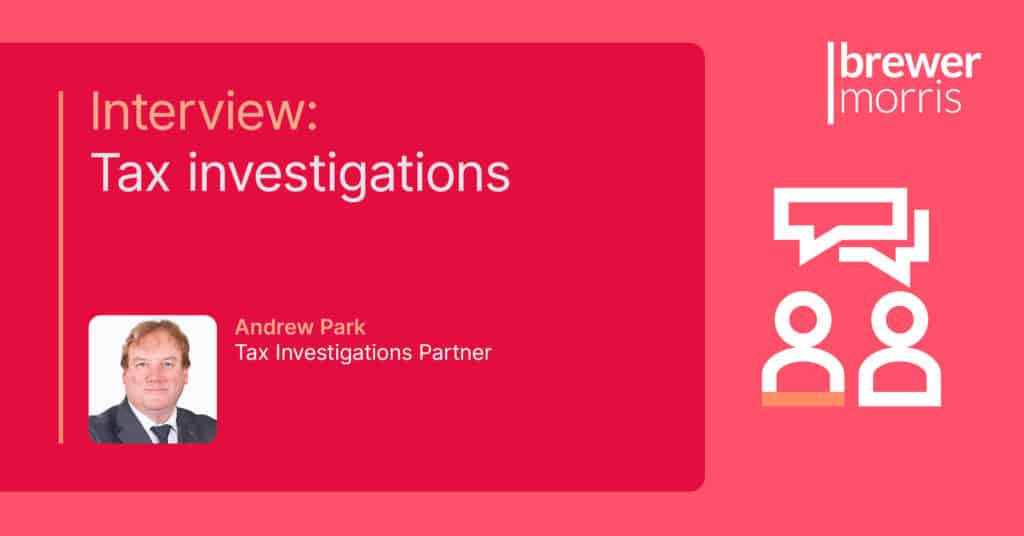Interview with Andrew Park: Tax investigations

At Brewer Morris we work with tax professionals across the market, all with specific skills and experiences and a wealth of knowledge to share. We spoke to Andrew Park, who is a Tax Investigations Partner with many years specialist experience. Andrew answered a few questions around the key trends within his niche and where he thinks the market is heading.
So Andrew, tell me a little about yourself..
I’m a Chartered Accountant and TEP. For well over 20 years I have specialised in tax investigations, tax disclosures and tax disputes for all UK taxes, for every sort of taxpayer, whether personal or corporate and UK or overseas based. Everything from the most complex COP 8 enquiries into high-net-worth international families and their business structures through to voluntary disclosures of basic errors. It is endlessly varied and fascinating work.
How has it been in the tax investigations world over the last few years?
We have lived in “interesting times”. HMRC and the tax courts continued to function during Covid but there was a dramatic drop in HMRC activity levels as HMRC shifted to full-time homeworking. Circa 12% of tax compliance staff were retasked to the Covid support schemes and HMRC was encouraged to “go easier” on struggling taxpayers both in slowing down existing investigations and pursuing determined debts less aggressively.
Notwithstanding the Covid issues and to make more limited HMRC resources stretch further, the growth in HMRC’s use of mass mailed “nudge letters” to suggest to taxpayers that HMRC had information they might have underpaid tax continued apace.
Accordingly, the balance of work during and in the aftermath of Covid shifted away from dealing with as many new investigations towards dealing with potential issues raised by HMRC nudge letters making pre-emptive voluntary disclosures generally to deal with problems identified by advisers rather than by HMRC.
Have you noticed the demand for tax investigations services has increased recently – why do you think this is?
Yes. There is a big upsurge in traditional HMRC investigation activity of all types – including hundreds of more new serious investigations being opened by HMRC Fraud Investigation Service.
On the one hand, HMRC is well on the way to renormalising after Covid – for instance, Inspectors are now back in their offices at least three days a week and better placed to conduct more complex investigations. On the other hand, HMRC is now under huge pressure to make good it’s drop-off in tax collection during Covid against a backdrop of the fiscal crisis caused by dealing with Covid and the consequences of the invasion of Ukraine. A December 2022 report by the National Audit Office estimates that HMRC recovered c. £9billion less tax in 2021/22 compared pre-pandemic as a direct consequence of HMRC doing less compliance work.
Whereas HMRC FIS Offshore Corporate and Wealthy is known not to have opened any new civil investigation of fraud investigations for c. two years during Covid. HMRC received additional funding of £73m in the recent autumn statement precisely to target high net worth individuals and their offshore assets.

What do the next few years hold for those working in the tax investigations market?
We are almost certainly going to busier than we’ve ever been. Beyond the immediate fiscal crisis, we have an aging population and huge costs of Net Zero to contend with. HMRC brings in c. £100 of tax for every 50 pence spent on it – so we can expect HMRC’s budget to increase even if other budgets don’t. At the same time, spiralling levels of tax will increase the temptation for many people to understate income, capital gains and death estates.
HMRC’s use of nudge letters will continue but we are probably approaching “peak nudge” i.e. the limits of HMRC’s ability to cajole people into higher levels of voluntary compliance. Most of the easy “low hanging fruit” has gone and necessity as well as political and public pressure is going to dictate that HMRC gets “back to the knitting” and goes back to high levels of traditional investigation work – particularly into the wealthiest people in society.
We can also expect HMRC to feel under pressure to be more aggressive in its approach to investigations (for instance in arguments over the level of penalties) and less accommodating once tax debts are determined. HMRC now presides over outstanding tax debts of c. £47bn compared to £19bn before the pandemic. Accordingly, I expect agreeing realistic repayment arrangements to become a bigger and more crucial part of the specialism.



